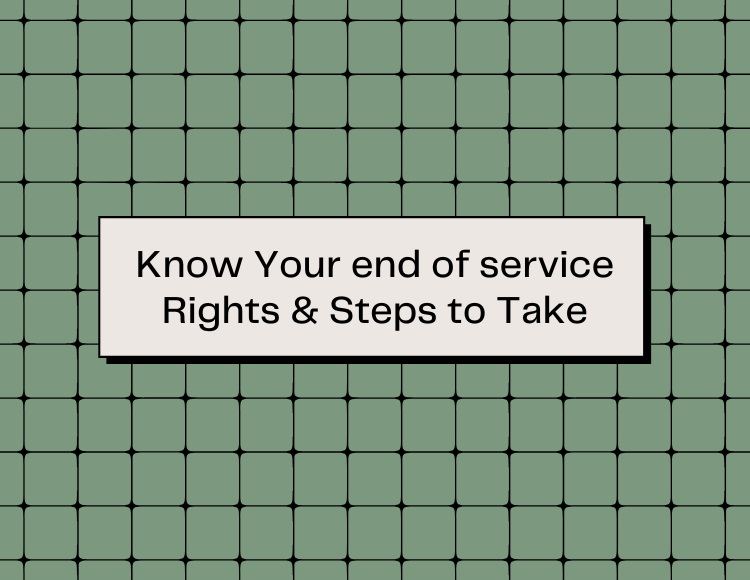Not receiving your End-of-Service Gratuity (EOSB) after completing your job in Saudi Arabia can be frustrating and stressful. You worked hard for it, and Saudi Labor Law guarantees it. If your employer refuses to pay, don’t worry—there’s a legal process to help you claim what you are owed.
Saudi Gratuity After 10 Years of Service: What to Expect
This guide explains your rights under Saudi labor laws and the steps you can take to recover your gratuity.
Your Rights Under Saudi Labor Law
Right #1: You Are Legally Entitled to Your Gratuity
Your EOSB is not a bonus or goodwill payment—it is your legal right. The amount you are entitled to depends on:
- Your total years of service
- The reason for leaving (resignation or termination)
- Your final salary (usually your basic salary plus fixed allowances like housing and transport)
Gratuity Calculation Based on Saudi Labor Law:
- If Terminated (Article 84):
- Half a month’s salary per year for the first five years
- One full month’s salary per year after five years
- If Resigned (Article 85):
- No gratuity if service is less than two years
- One-third of the amount for 2-5 years
- Two-thirds for 5-10 years
- Full gratuity for more than ten years
Tip: Calculate your gratuity in advance so you know exactly how much you are owed.
Expat Gratuity Rights in Saudi Arabia: Resignation vs. Termination
Right #2: Your Employer Must Pay on Time
The law requires gratuity payments within:
- One week after resignation
- Two weeks if your employer terminated you or your contract expired
If your employer has missed the deadline, they are violating Saudi Labor Law.
Right #3: You Can Demand Payment in Writing
Before filing a complaint, you must first formally ask your employer to pay.
How to Request Payment
- Send an email or registered letter to your employer
- Keep a copy as proof
- Be polite but firm
What to Include in Your Request
- Your full name and Iqama number
- Your job start and end dates
- The amount of gratuity you are claiming
- A reference to Article 88, which sets the payment deadline
- A reasonable deadline for them to respond (5-7 working days)
This step is critical—it shows you tried to settle the matter before escalating it.
Right #4: You Can File a Complaint with MHRSD
If your employer ignores your request, you can file a formal complaint with the Ministry of Human Resources and Social Development (MHRSD).
How to File a Complaint Using ‘Widdi’
- Log in to the MHRSD portal (via Absher or Qiwa)
- Go to the “Amicable Settlement” (Widdi) section
- Fill in the complaint form with:
- Your personal details
- Employer details
- Contract dates
- Salary details
- Clearly state your claim (e.g., “Unpaid End-of-Service Gratuity”)
- Attach evidence:
- Your contract
- Proof of final salary
- Termination/resignation letter
- Your gratuity request email/letter
MHRSD will assign a mediator to resolve the issue within 21 working days.
Right #5: You Can Take Your Case to Labor Court
If Widdi fails, your case can be escalated to Labor Court.
- Labor Court hears cases formally and follows Saudi Labor Law.
- A judge reviews your evidence and makes a legally binding decision.
- Your case is stronger if you have proper documentation.
Right #6: You Have the Right to Present Evidence
To win your case, you must provide clear evidence.
Essential Documents for Your Gratuity Claim
☑ Employment contract (Arabic version is best)
☑ Proof of employment period (contract dates, GOSI records)
☑ Proof of final salary (bank statements, salary slips)
☑ Termination or resignation letter
☑ Copy of your formal gratuity request
☑ Employer’s response (or proof they ignored you)
☑ Widdi complaint reference number & outcome
☑ Valid Iqama copy
Keep originals safe and organize your copies properly.
Right #7: You Can Get Legal Help
For Widdi, you can handle the case yourself. But for Labor Court, legal representation is highly recommended.
Why a Lawyer Helps:
- Files official case statements
- Prepares strong legal arguments
- Handles formal procedures
- Represents you in Arabic
Look for a lawyer experienced in Saudi labor disputes.
Right #8: Time is Limited – Act Fast
You have only 12 months from the end of your contract to file a claim.
- Miss this deadline? You lose your right to claim your gratuity forever.
- Act quickly: Start the process as soon as your payment is overdue.
Right #9: You Can Enforce the Judgment
If you win the case but your employer still refuses to pay, take your judgment to Enforcement Court (Tanfeeth).
They can:
- Freeze the employer’s bank accounts
- Seize assets
- Force payment through legal measures
A lawyer can handle this process for you.
Frequently Asked Questions (FAQs)
Q1: Is there a fee for filing a complaint?
- Filing with MHRSD (Widdi) is usually free.
- Labor Court may not charge fees for employees.
- Lawyer fees depend on your case.
Q2: Can my employer fire me for filing a complaint?
No. Retaliation for claiming legal dues is illegal. If this happens, you may have a case for unfair dismissal.
Q3: I signed a clearance form (mukhalasa), but I never got paid. Can I still claim?
Maybe. If you can prove you never received payment (e.g., no deposit in your bank), you can argue that the signature was conditional or given under pressure.
Q4: My employer paid part of my gratuity but made deductions. Can I dispute this?
Yes. If deductions were unfair or not legally allowed, file a complaint for the remaining amount.
Q5: Can I file a claim if I already left Saudi Arabia?
Yes, but you must appoint a lawyer in Saudi Arabia using a power of attorney (Wakala).
Q6: My employer is threatening me for pursuing my claim. What should I do?
- Document all threats (date, time, witnesses).
- Report threats to MHRSD or local authorities if necessary.
Conclusion: Take Action and Claim What is Yours
Your gratuity is not a favor—it is your earned right under Saudi Labor Law. If your employer refuses to pay:
- Send a formal request
- File a complaint with MHRSD (Widdi)
- Go to Labor Court if needed
- Enforce the court decision if payment is delayed
Time is critical—act fast, document everything, and seek legal help if necessary.

